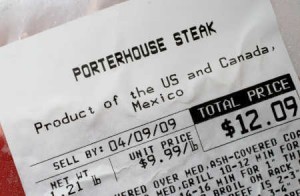WASHINGTON, D.C. – A final ruling by the World Trade Organization (WTO) on country-of-origin labeling (COOL) may soon end Americans’ ability to know where food they purchase comes from. A U.S. regulatory policy passed in 2008 that requires country-of-origin labeling on meat sold is now in jeopardy of being negated by an international ruling.
 Canada and Mexico collaborated to see U.S. regulations that required country-of-origin labeling on meat overruled by the World Trade Organization. The end result will be that millions of Americans will consume meat from unknown origins. Under WTO rules, Mexico and Canada may soon be able to impose trade sanctions against the United States if it does not eliminate packaging labels that do not comply with the WTO ruling. If the law is weakened, American families may not be able to know where there food is coming from, and health regulators may have a harder time tracking food borne bacteria to its point of origin.
Canada and Mexico collaborated to see U.S. regulations that required country-of-origin labeling on meat overruled by the World Trade Organization. The end result will be that millions of Americans will consume meat from unknown origins. Under WTO rules, Mexico and Canada may soon be able to impose trade sanctions against the United States if it does not eliminate packaging labels that do not comply with the WTO ruling. If the law is weakened, American families may not be able to know where there food is coming from, and health regulators may have a harder time tracking food borne bacteria to its point of origin.
Lori Wallach, director of Public Citizen’s Global Trade Watch, warned the implications for consumer safety were distressing: “Today’s ruling makes very clear that these so-called ‘trade’ pacts have little to do with trade between countries, but rather impose outrageous limits on the most basic consumer safety policies on which we all rely. The WTO announcing that big agribusiness corporations must be allowed to sell mystery meat here, despite U.S. consumers and Congress demanding these labels, is yet another example of outsourcing our legal system to international commercial bodies that push corporate interests.”
As a member of the WTO and co-signer to the far-reaching Trans-Pacific Partnership that enables other countries to skirt the American legal system, the U.S. is obligated to abide by regulations that supersede its own sovereign laws.
WTO member countries have agreed to prohibit engaging in “unfair” trade practices that discriminate against other WTO member countries. Canada and Mexico claim the U.S. Department of Agriculture meat labeling requirements are not consistent with international standards, and thus discriminate against WTO member countries.
The WTO Appellate Body agreed with Mexico and Canada that U.S. COOL regulations covering meat sold in America violated fair trade guidelines approved by the WTO. The end results is that, as long as the U.S. is a member of the WTO, it cannot pass or enforces consumer safety laws that violate international free trade guidelines issued by foreign, unelected bureaucrats.
Wallach noted: “The administration appears to have abandoned its leverage and greenlit Mexico and Canada joining the TPP without an agreement to drop their WTO attack on consumer labels. The American public is desperately waiting for President Barack Obama to show some negotiating savvy, and to start fulfilling his campaign pledges and reconsider the so-called ‘trade’ model that his administration is pushing with the TPP.”
The WTO decision will be finalized in about a month, and America will have 30 days after that to decide whether or not it will comply. Considering the current administrations support for international agreements, compliances is likely. The Obama administration is in the process of negotiating the secretive TPP trade deal, an expansive deal that expands on the North American Free Trade Agreement which currently includes 11 Asian and Western Hemisphere countries. The pact is expected to include limits on domestic consumer safety and labeling policy.
©2012 Off the Grid News
 Off The Grid News Better Ideas For Off The Grid Living
Off The Grid News Better Ideas For Off The Grid Living



